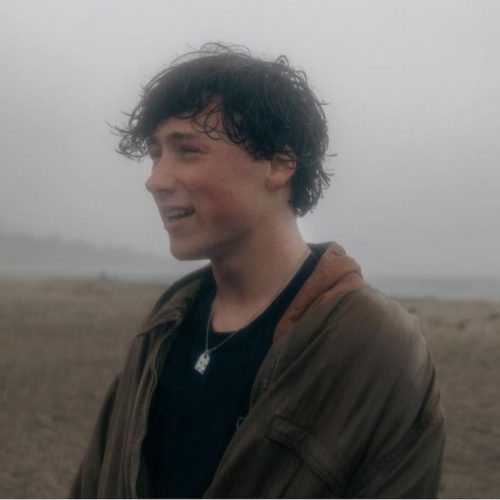Jake Minch has a young adult voice: newly strong, brave enough to let its softness show. You can hear the little kiss he gives to the word “you.”
His speaker in “handgun” narrates with that same combination of strength and tenderness: strong enough to carry some heavy questions, tender enough to sing about love.
This looks at first like a straightforward broken-heart love song.
The first verses detail the particulars of a heartbreak, focusing on the goofy parts: spilling a white claw on your crush, kissing in the laundry room. These details keep the song from getting too caught up in its own drama. Steady and thoughtful acoustic guitar carries us along, and an assortment of odd little sounds – electric guitar that’s gritty and shimmery and the same time, and something like the call of a lonely spaceship – join in as the song progresses, almost as if they heard the guitar and got curious.
Then the chorus asks, “Who gives a kid a handgun? / Who gives a kid to a mom who doesn’t want one?”
These questions come out of nowhere; or rather, they come out of the news. They intrude upon the song in the same way they intrude upon any romance: jarringly, and unavoidably. In realizing how much one person can matter to us, we realize how precious other people are. And it seems insane that anyone would hurt anyone else. But there they go again, all over the news. What do you do with that?
You grow up. Maybe it goes like this: “you bleached you hair for the swim team / said it’s for kids with cancer or something / you said you’d never live to see eighteen / but you cut it all off for your birthday last week.”
This lyric is a double hit, a gut-punch and the gasp of air after. Despite the gesture of hair bleach solidarity, the kids still have cancer; despite despair, the swimmer is still alive at eighteen. Minch’s character watches another young person wrestling with their own helplessness: grand gestures that don’t accomplish much, premonitions of doom that don’t come true.
He watches someone fail, and survive.
Minch sings, “the worst part of growing up is learning how young you are.” I remember, when I was a teenager, coming into a widening awareness of how much trouble we’re in, and feeling a sharp suspicion that the qualities that bring a happy ending in a children’s book – courage, kindness to strangers and animals, true love – don’t count for much in the places where decisions get made. What do you do with that?
Maybe you ask more questions. Minch’s next set have a different tone from the first: “Who let that kid fall in love? / Who never told him enough is enough is enough?” These don’t have clear answers: who could keep someone from falling in love? But by being impossible to answer, they direct us to a better question: what do you do with that? Now that your heart is broken, what will you build?







